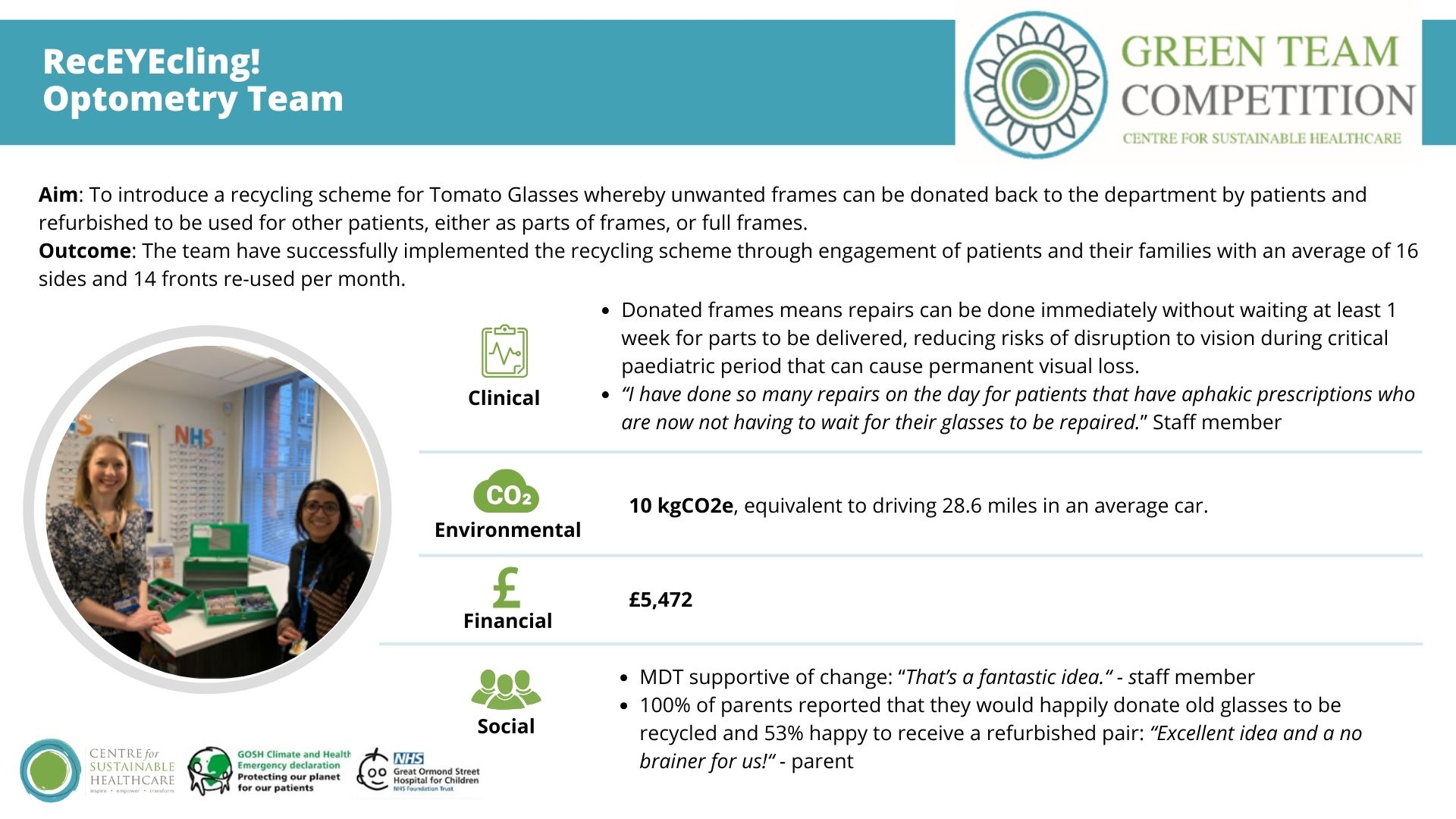
Great Ormond Street Hospital for Children NHS Foundation Trust Green Team Competition expected to save £284,098 and 4,797 kgCO2e annually
In September last year, Great Ormond Street Hospital for Children NHS Foundation Trust (GOSH) commenced a Green Team Competition in partnership with the Centre for Sustainable Healthcare. The competition has brought anticipated annual savings to the Trust of £284,098 and 4,797 kgCO2e. This is the carbon footprint equivalent of driving 14,167 miles in an average car (or 129 return trips between GOSH and Brighton).
Through the Green Team Competition, six teams from GOSH were selected to engage in our award-winning programme in sustainability in quality improvement (SusQI) that transforms expert knowledge into action. Each team received mentoring from CSH facilitators to drive healthcare transformation by developing, implementing and measuring the impact of projects through the lens of the sustainable value equation.
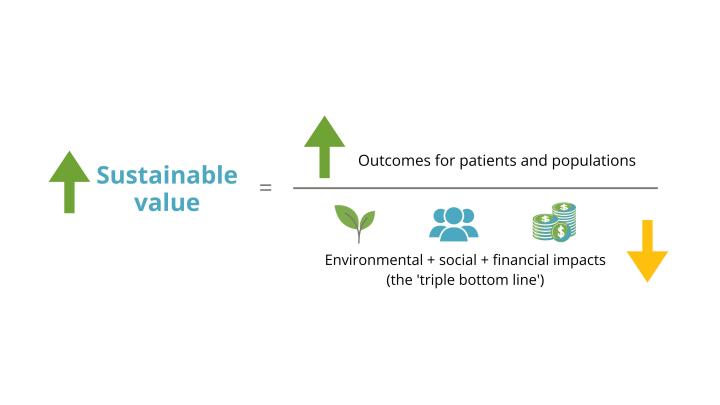 At the April Showcase and Awards Ceremony, the teams presented their projects, including the anticipated savings and opportunities to scale and spread, to an audience from the Trust and the judging panel including:
At the April Showcase and Awards Ceremony, the teams presented their projects, including the anticipated savings and opportunities to scale and spread, to an audience from the Trust and the judging panel including:
- Stephen Tomlin, North Central London (NCL) Lead for Sustainable Medicines
- Peace Joseph, GOSH Governor, also member Governors Sustainability Working Group
- Dr Ayoma Ratnappuli, Education Fellow, The Centre for Sustainable Healthcare (CSH)
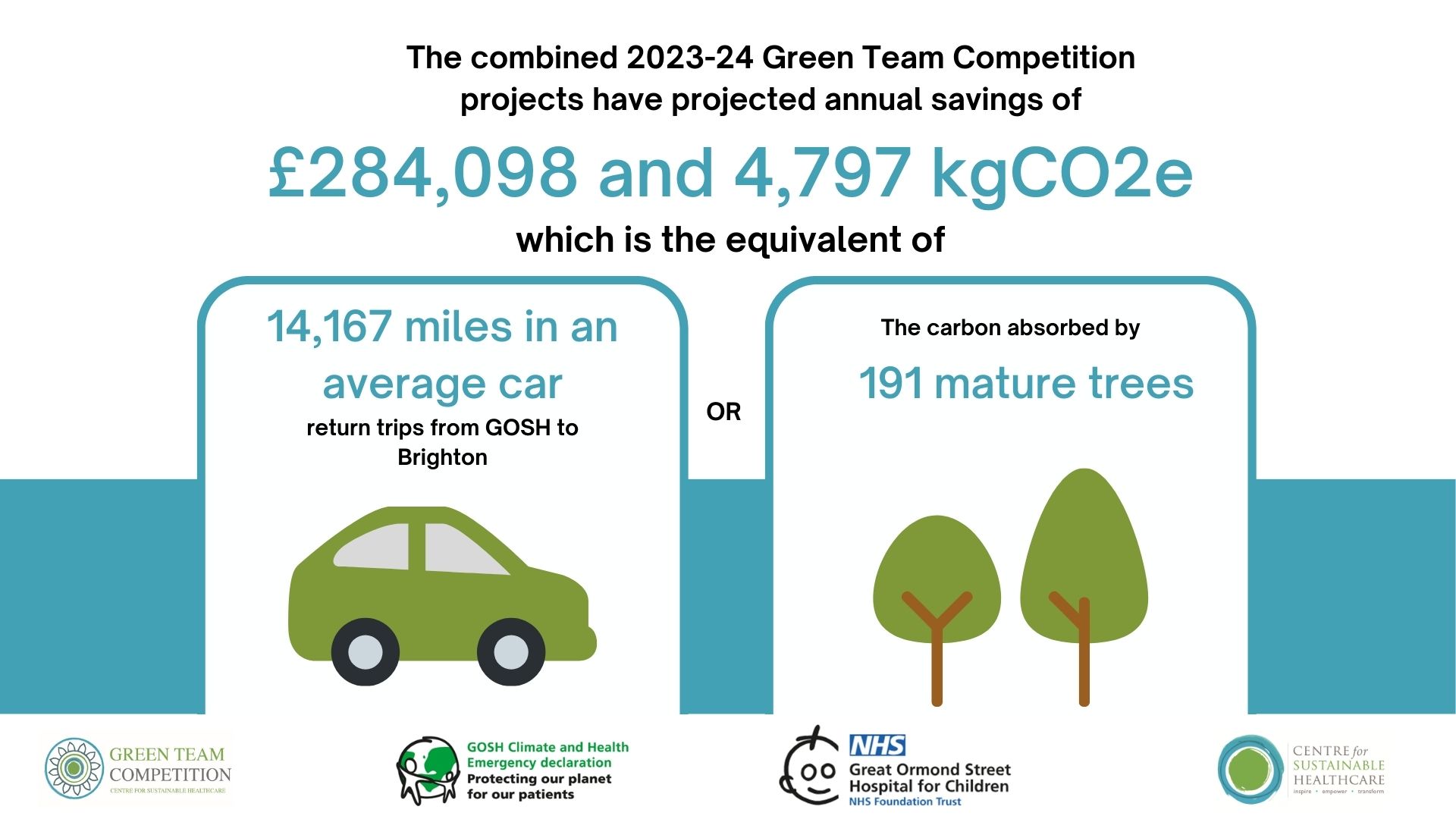
“It was a real pleasure to see the teams showcase their amazing work and accomplishments over the past 10 weeks. It was an informative experience for me as a judge and a great opportunity to celebrate the success of all the teams. All hands need to be on deck to support and scale these projects if we are to see the sustainable change we seek”.
Peace Joseph, GOSH Governor and member of the Governors Sustainability Working Group
Awards

Congratulations to the winning team, the Pharmacy for their project Kapsule Kids!
The project focussed on empowering children to switch from liquid to tablet medications and is an excellent example of a change improving outcomes across the sustainable value equation.
“Overall, this project has been a delight to carry out. Working with Snehal and the overall team has been wonderful and seeing the patients effectively take their medication knowing the global and economic impact made is encouraging.”
Sadhna Ayesha Sharma, Cardiology Pharmacist
“I have thoroughly enjoyed doing this project alongside Sadhna. It is extremely encouraging to see patients be able to take control of their own care and work together with them and their families to ensure the best outcomes. Although it was only launched in a small cohort of patients, the environmental and financial outcomes we came out with were a lot and gives me courage to attempt to expand this project going forward.”
Snehal Bakrania, Medicines information pharmacist
The Centre for Sustainable Healthcare would like to thank and congratulate all teams that took part in the competition. The competition's outcomes serve as proof of the teams' commitment and efforts to improving the sustainability of the healthcare system.
Green Team Competition Projects
Read the full Impact Report here or view the project summaries below.
- Kapsule Kids, Pharmacy (Cardiac ward)
- Reducing hospital plastic use through re-use of LPDE plastic feed hanging bags for up to 7 days, Nursing team on Koala Ward
- Sustainable use and reuse of Augmentative and Alternative Communication devices in GOSH, Speech and Language Therapy (SLT)
- Optimising wheelchair returns in a PAN Hospital Wheelchair Service, Occupational Therapy (OT)
- Sustainably supporting mobility - Developing a walking aid re-use scheme at GOSH, Physiotherapy (PT)
- RecEYEcling, Optometry
1. Kapsule Kids, Pharmacy (Cardiac ward)
Team members: Snehal Bakrania, Medicines information pharmacist and Sadhna Ayesha Sharma, Cardiology Pharmacist
Setting / patent group: Paediatric heart and/or lung transplant patients
Issue
Liquid medication is often the default choice in paediatric prescriptions due to the assumption that it is easier to administer to children. There are several drawbacks to relying on liquid medication, including shortages of raw materialsand the formulations being more expensive and harmful to the environment. Evidence suggests children as young as three can safely swallow tablets and capsules, leading to successful initiatives like Pill School at Evelina London Children’s Hospital and the KidzMed project at Great North Children’s Hospital. Following suit, Great Ormond Street Hospital implemented a similar programme to train post-heart and lung transplant patients to take tablets, aiming to transition lifelong medication recipients to more sustainable formulations.
There are an average of 20 heart and/or lung transplant patients at GOSH per year who require expensive medications, often for their lifetime. The team focused on this population for a trial of their changes.
Intervention
The transplant medications that were included in this project consisted of tacrolimus, mycophenolate mofetil (MMF), paracetamol, and co-trimoxazole.
Eligible patients were identified by an MDT. Training was conducted by the ward pharmacist and ward MMT using techniques outlined on the KidzMed training platform, Evelina’s Pill School protocol, and the development of our own pill information booklet for patients. The Cardiac Ward pharmacist would have a discussion as soon as they stepped down from CICU to explain the aims of Kapsule Kids to the patient and their parents or carers. Upon agreeing to participate, the patient’s take-home medicines were prescribed as tablets and dispensed to the ward soon after to facilitate early training in the controlled environment of the ward prior to discharge.
Outcomes
During the project period, five patients successfully transitioned to tablets instead of liquid medications. The projected savings below are based on transitioning 10 patients a year and include 1 year’s supply of tacrolimus and mycophenolate mofetil (MMF) and a 6-week supply of co-trimoxazole (from then provided by a local pharmacy).
Clinical sustainability: patients and families are reassured that swallowing tablets is safe and may improve compliance due to the poor palatability of some liquid medications. Address concerns regarding the national co-trimoxazole liquid shortage.
Environmental and economic sustainability: £258,255 and 329 kg CO2e per year, equivalent to driving 972 miles in an average car.
Social sustainablilty: tablets are easier for families to transport and store and have longer expiration dates once opened. Contributes to improving long-term independence for young adults. Ward nursing staff save time by drawing fewer liquid medicines. The pharmacy team found supporting children to learn a new skill satisfying for their job role; however, the project did come with a burden on time for an already very busy team. Reduced need for MMF liquid, which carries teratogenic risks to pregnant staff.
Key learning point
There are many benefits to training patients on how to take pills from an early age, including improved adherence, cost savings, better continuity of care, and being more environmentally sustainable.
Simply asking patients if they would like to attempt taking pills can lead to patient engagement. Easing parent and carer anxiety is the key to encouraging children to take tablets and capsules and finding a vehicle of delivery that is acceptable to the patient. Creating a safe and comfortable environment with room for an open discussion has been the main driver of the success of this project.
Empowering the patient through direct conversation has provided them with success in sustainability.
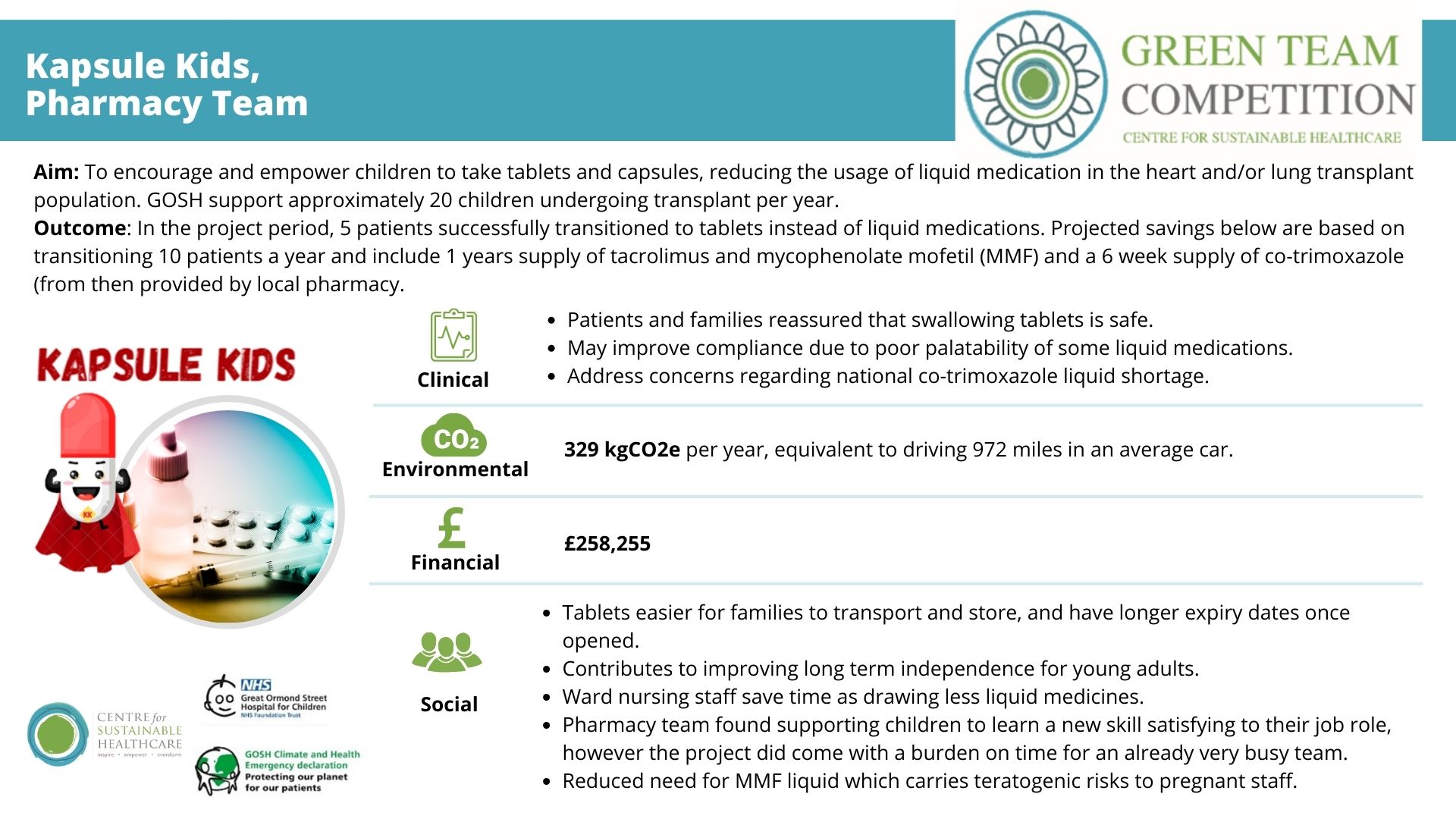
Team members: Vicky Gately, Clinical Band 7 Nurse; Katie Lord, Practice Educator; Ella Johnson, Practice Facilitator; and Sophie Jackson, Clinical Band 7 Nurse
Setting / patent group: Inpatient paediatric ward
Issue
On Koala ward, many patients require enteral feeding due to their inability to drink orally. Enteral milk feeds are administered over specific periods, requiring the use of plastic feed hanging bags sourced from China to hold the feed bottle upside down as the feed is administered to the patient. Although these bags are single-use, they do not come into contact with the feed or any liquid, making them suitable for reuse to reduce plastic waste.
Intervention
Implementing the reuse of enteral feed hanging bags for eligible patients on Koala ward throughout their admission or up to 7 days. Approval for this change was obtained from the infection prevention and dietetics teams. Ward staff were educated through email and posters, and nurses confirmed their awareness and commitment to reusing the bags by signing a register.
Outcomes
While the accumulation of stock from last year (5000 bags) complicates procurement changes, a 2-week audit suggests a potential reduction of 75% (16,000 bags) annually.
Patient outcomes: Patients are not affected by the change.
Environmental and economic sustainability: £967.20 and 193 kgCO2e per year, equivalent to driving 570.1 miles in an average car.
Social sustainability: 100% of surveyed nurses expressed concerns about healthcare's environmental impacts, with 96% worried about waste on Koala. This initiative empowers staff to address these concerns by reducing plastic usage, a change they find simple and time-saving
Key learning point
This simple yet effective change is easy to implement across the Trust through dissemination of information to educators, dieticians and potentially as a trust wide initiative.
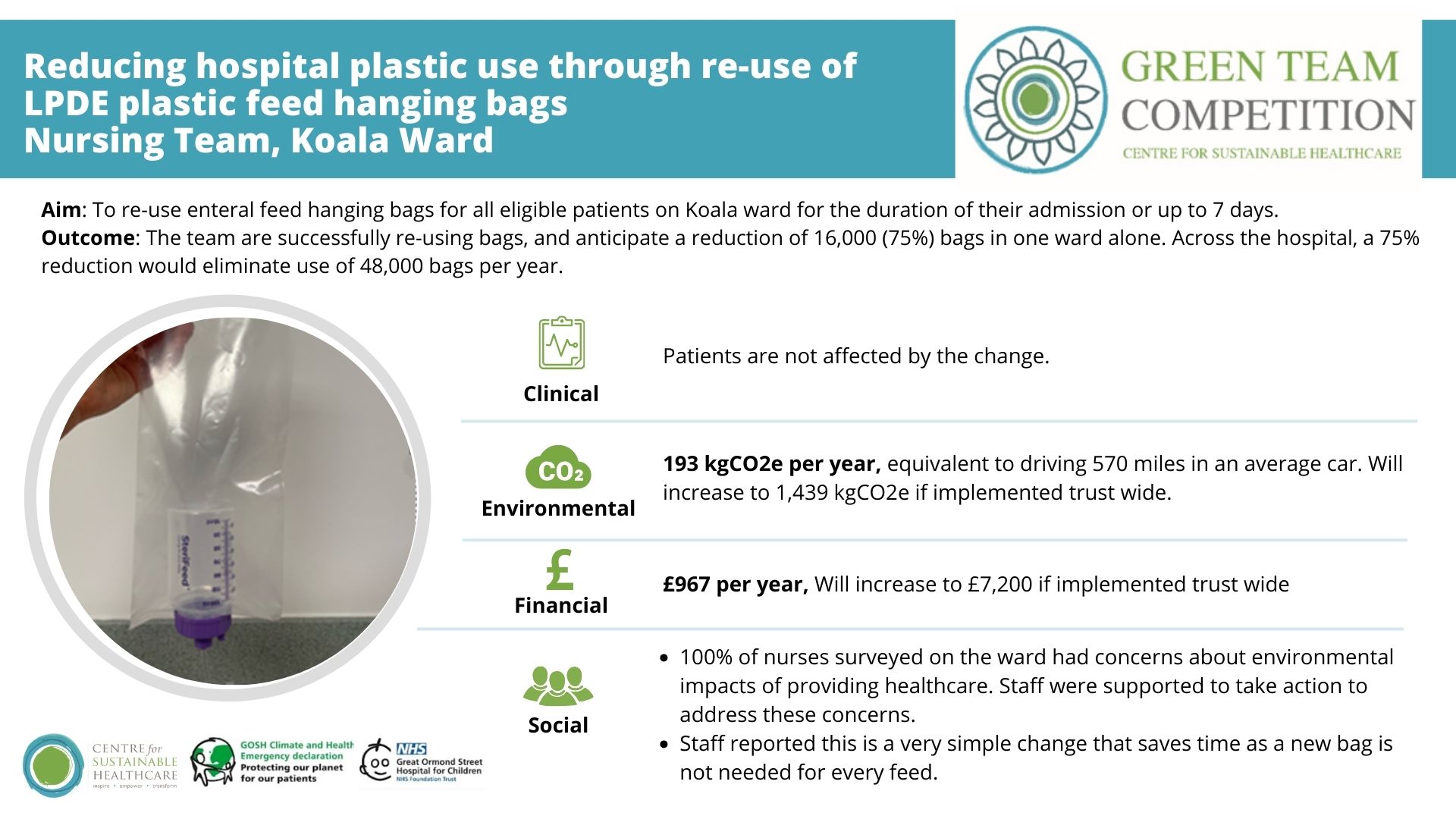
Team members: Phillippa Mackenzie and Yasmin Dolin, Speech and Language Therapists
Setting / patent group: Children and young people requiring tertiary assessment and intervention through the GOSH Augmentative Communication Service (ACS).
Issue
GOSH ACS observed a significant number of AAC users not utilising their communication devices effectively, leading to suboptimal patient outcomes and contributing to financial and environmental waste. We realised through process mapping that there was little within the current process to encourage patients to return unused or broken devices. The aim of this project was to assess process changes that could enhance patient outcomes while addressing social, economic, and environmental aspects.
Intervention
- improve device return rate for un-used devices
- extend lifespan of long-term devices
- reduce courier journeys to GOSH for device repairs
- donate devices to local SLT services when they are no longer suitable for patients or GOSH team
The team made the following changes:
- Providing information to families to encourage early identification of problems with device usage at device handover, including information on the environmental benefit of returning devices if they are not of benefit to them, and troubleshooting support.
- Emailing families and locals services six weeks after device issue, reminding families to contact us with any problems.
- Patient progress monitoring (PPM) moved from 24 months to 12 months: this is designed to increase the return rate for unused devices as well as identify problems earlier, thus improving patient outcomes. This aim will be initiated during this project, but it will take at least 12 months to achieve.
- Extending the lifespan of long-term devices for service users (new and returned devices). Previously, devices would not be re-issued to patients if they were older than 2 years, unless for a user with a history of breaking devices. Criteria were created for ensuring an equitable way of weighing up sustainability goals with patient outcomes, considering how old the device is, how often it was used prior to being returned, and how much it would cost to repair it (if applicable), then comparing it to the child’s needs and their history of requiring repair or replacement.
- Donating suitable devices to local services when no longer suitable for service users or required by the team We have planned an information morning for local SLTs in February 2024. We intend to donate several devices to local SLT services this morning.
Outcomes
The team requires 6–12 months to collect data. Projected annual savings are detailed below.
Clinical outcome: patients no longer using their device will be identified and can be re-assessed for a more suitable device sooner, improving patient communication both at home and school, and benefiting wellbeing and educational attainment.
Environmental and financial sustainability: £6,073 (£5,600 from repurposing 4 additional devices/software and £473.10 by reducing repairs by 1 device per fortnight). And 772 kgC2e, equivalent to driving 2,280 miles in an average car (483 kgCO2e from repurposing 4 additional devices/software and 289.4 kgCO2e by reducing repairs by 1 device per fortnight).
Social sustainability: local SLTs, teachers, and parents are empowered to troubleshoot simple issues, preventing delays in children accessing their device while they wait for support. Reduced troubleshooting calls to our service save staff time. Donating old devices to local SLTs (rather than back to manufacturers) provides local teams with resources they would not otherwise have access to. These can be used for their own training as well as patient trials. This may support local SLT confidence and job satisfaction.
Key learning point
This project has allowed the team to recognise that by making some simple and achievable changes to their current device loaning process, they can improve patient outcomes while increasing their environmental sustainability, economic sustainability, and social sustainability targets.
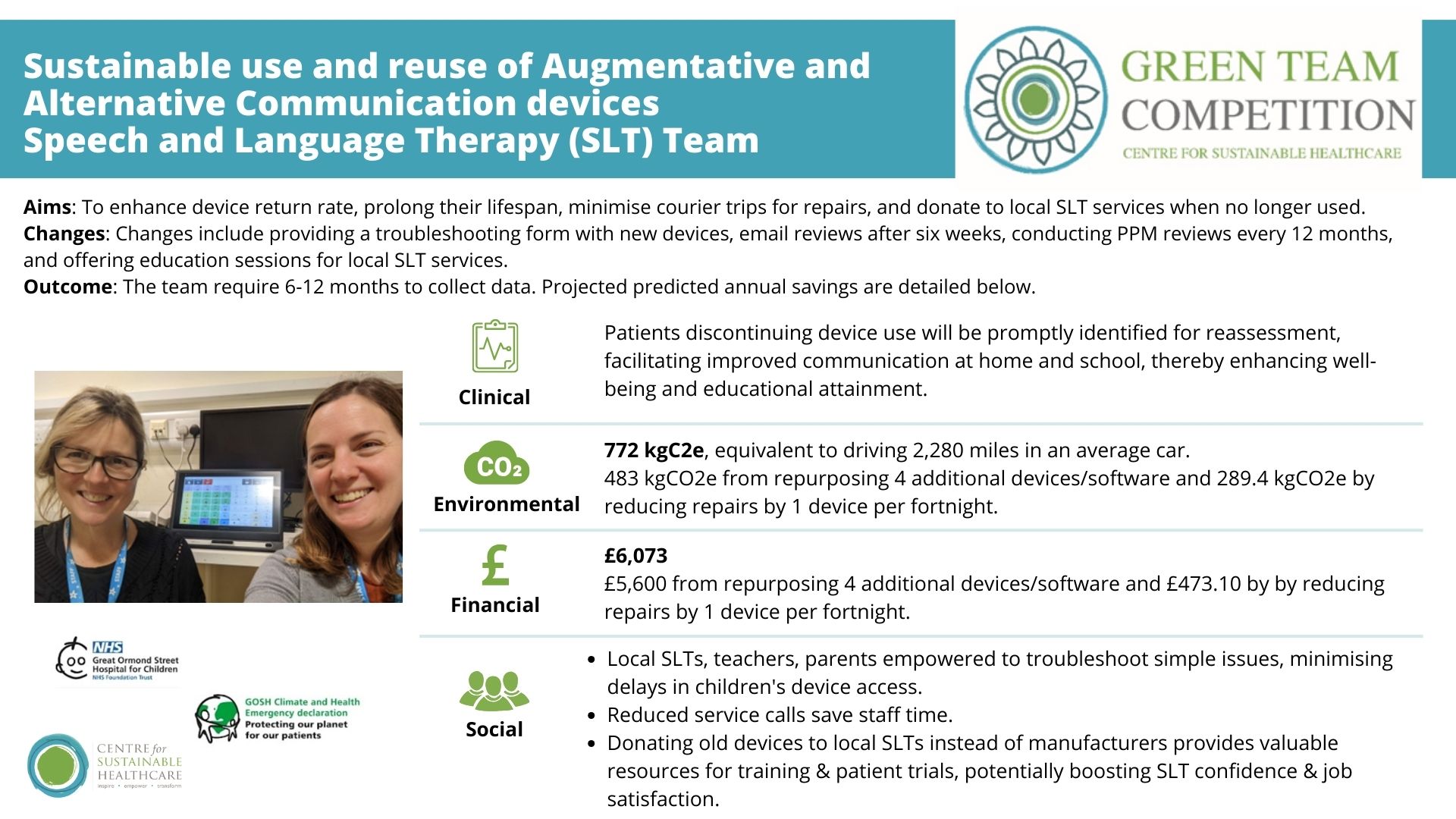
4. Optimising wheelchair returns in a PAN Hospital Wheelchair Service, Occupational Therapy (OT)
Team members: Caroline Haynes and Tayana Harding, Clinical Specialist Occupational Therapists
Setting / patent group: PAN Hospital Wheelchair Service for paediatric inpatients at GOSH
Issue
The return of wheelchairs from home loans is increasingly becoming an issue, as wheelchairs are often out for longer than the agreed loan period. This then leads to a shortage of chairs, which has resulted in the need to purchase more wheelchairs in the past. Currently, wheelchairs over their expected date of return are only followed up on when a specific wheelchair is needed or availability is extremely low, which may delay access for another patient. As a team, they saw an opportunity to evaluate and improve this process, bringing sustainable value to their service.
Intervention
Following a review of their current processes and staff perceptions and use of the current process, the team plans to create a new standard operational procedure to facilitate improved stock flow of wheelchairs in the wheelchair store.
Their proposed changes include:
- Updating their loan form with clear and simple wording regarding the loan process and highlighting the key points, such as ways of return and loan timing, will aim to draw the attention of the family.
- Monthly loan monitoring data on the number of wheelchairs available for loan and the number of chairs still on loan passed the due return date.
- Change to loan process and communication: OT will always inform the family of the loan length, the need to return the wheelchair within a week of the date, and the need to contact the therapist if there is a significant reason why the wheelchair cannot be returned.
- Identify one member of staff to contact and remind patients / parents of the date of the return.
- A member of staff to contact parents two weeks past the return loan date if the wheelchair has not been returned or the parent has not been in contact.
- Team engagement and education to ensure staff understand the criteria and process of loaning and returning loaned wheelchairs.
Outcomes
The team identified that 80% of home loans are currently returned; however, this could be improved through standardisation of the loaning and return process.
Clinical outcome: children may have faster access to the most suitable chair for them, which may be beneficial in several ways, e.g., sitting up helps reduce the chance of chest infections as well as prevent musculoskeletal contractures.
Environmental and financial sustainability: Based on a 10% increased return rate (of 4 specialists and 8 standard chairs), the team could save £12,376 and 1,893 kg CO2e per year, equivalent to driving 5,590 miles in an average car.
Social sustainability: faster access to chairs may reduce stress and frustration for patients and their families. Children are more readily able to engage socially with family, see friends, go to school, etc. A streamlined process may reduce frustration and time spent finding and loaning wheelchairs due to increased availability, boosting staff well-being and job satisfaction.
Key learning point
The key to increasing the availability of wheelchairs in the Pan Hospital Wheelchair service will be to ensure timely returns of loaned wheelchairs through staff and patient engagement.
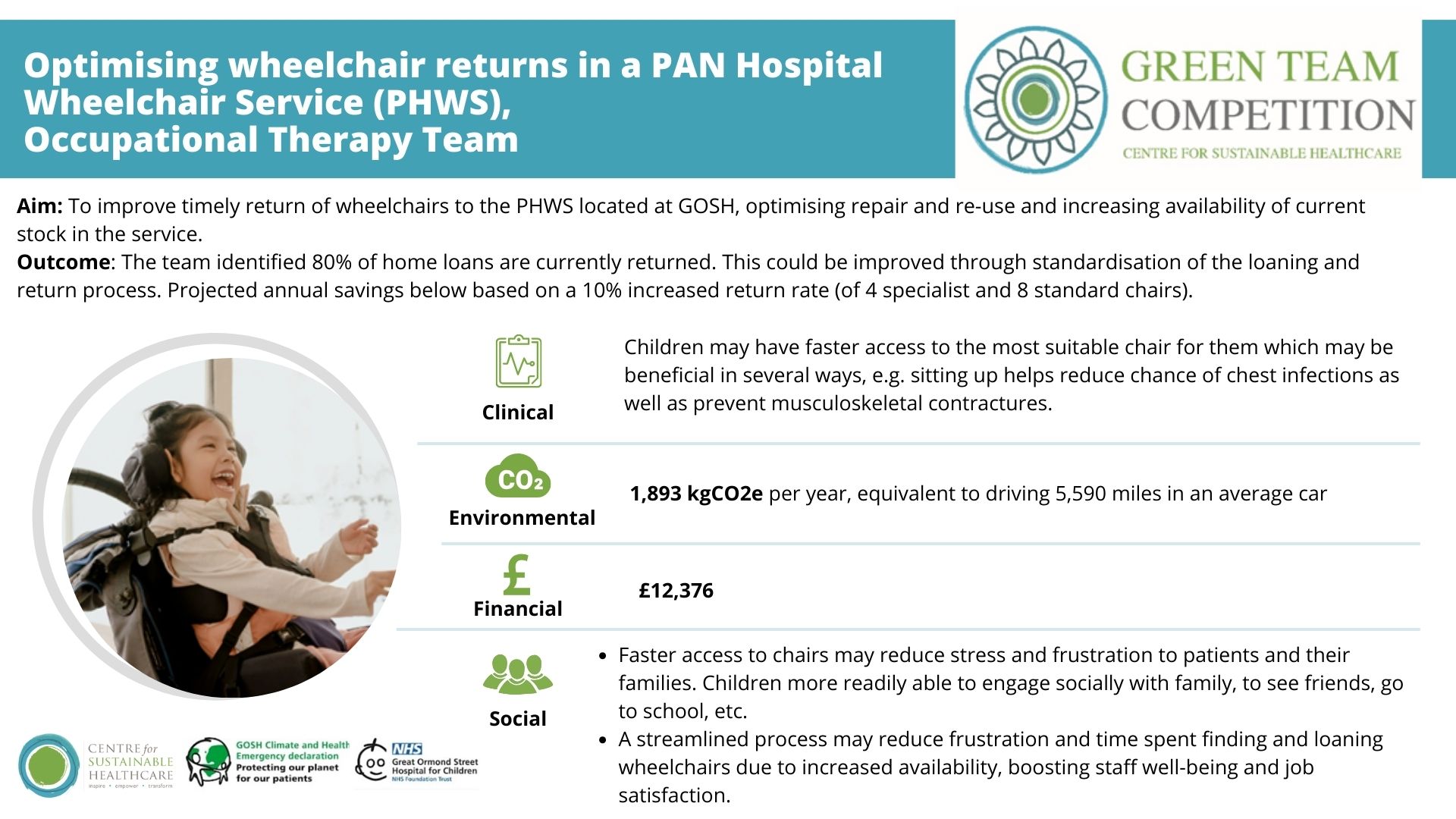
Team members: Nicola Moore, Zoe Vamplew, Amy Young and Rachel Naunto, Physiotherapists
Setting / patent group: Physiotherapy department in paediatric hospital
Issue
Walking aids have historically been single-use items and have not been accepted back by NHS Trusts. However, this has changed due to initiatives such as Greener NHS, which published a detailed how-to guide, “10 reasons why to start or expand a walking aid reuse and return scheme,” to support Trusts to establish in-house walking aid re-use and refurbishment schemes. Greener NHS has also developed a coordinated return scheme for patients in collaboration with the Sustainable Healthcare Network Hub. Within this, patients can return used walking aids to local drop-off points at a variety of locations.
As a physiotherapy team, they had already identified that walking aid reuse was an area their hospital could improve on significantly, and they started the return scheme in January 2022. However, while they have been receiving reused aids under the scheme for some time, the team identified that they could significantly improve both the return of aids by patients and the amount of aid being re-used.
Intervention
Following research and a staff survey of current practice and understanding of return processes, the team created a standardised pathway for physiotherapy staff to safely assess, clean, and refurbish returned aids for re-use. A potential challenge in terms of the time and resources required to undertake the pathway regularly was identified. As a result, they provided education and distributed roles to therapy assistants and administrative staff so that each step of the process had a named person responsible. For example, the team designated responsibility for the collection of returned walking aids, transporting them to storage, and sorting them for a specific member of the team.
They also identified that they needed to provide consistent advice to families about the new system and that this needed to be accessible to all. To overcome these barriers, the advice included information about how to return aids closer to home and education on how to make the aids safe for reuse. The team added the same information to the GOSH website to facilitate wider access. In the short term, advice is provided verbally to families at discharge and clinic appointments and via posters in clinical waiting areas.
Outcomes
Clinical outcome: there will be no impact on patient care or clinical outcomes.
Environmental and financial sustainability: based on the current return rate (24%), £955 and 1,600 kgCO2e will be saved per year, equivalent to driving 4,725 miles in an average car. The team aims to further improve the process, which will increase returns and savings.
Social sustainability: staff wanted to see more walking aids returned and re used, however they were unsure of how to do this - the project has helped clarify processes with staff commenting
“It is easy to follow” and “following the chart helps me check the aids logically”.
Patients have commented
“Returning my crutches locally saves a lot of time and hassle” and “I’m happy they’re not just going to waste.”
Key learning point
Overall, this project has been useful to help understand the processes required to undertake a detailed quality improvement on the team's existing walking aid re-use scheme. The key elements that contributed to this learning were the wider discussion with professionals around carbon footprinting and how to set up a quality improvement project. Also, the wider research and national webinars were interesting to attend and discuss to learn what is going on in the wider NHS.
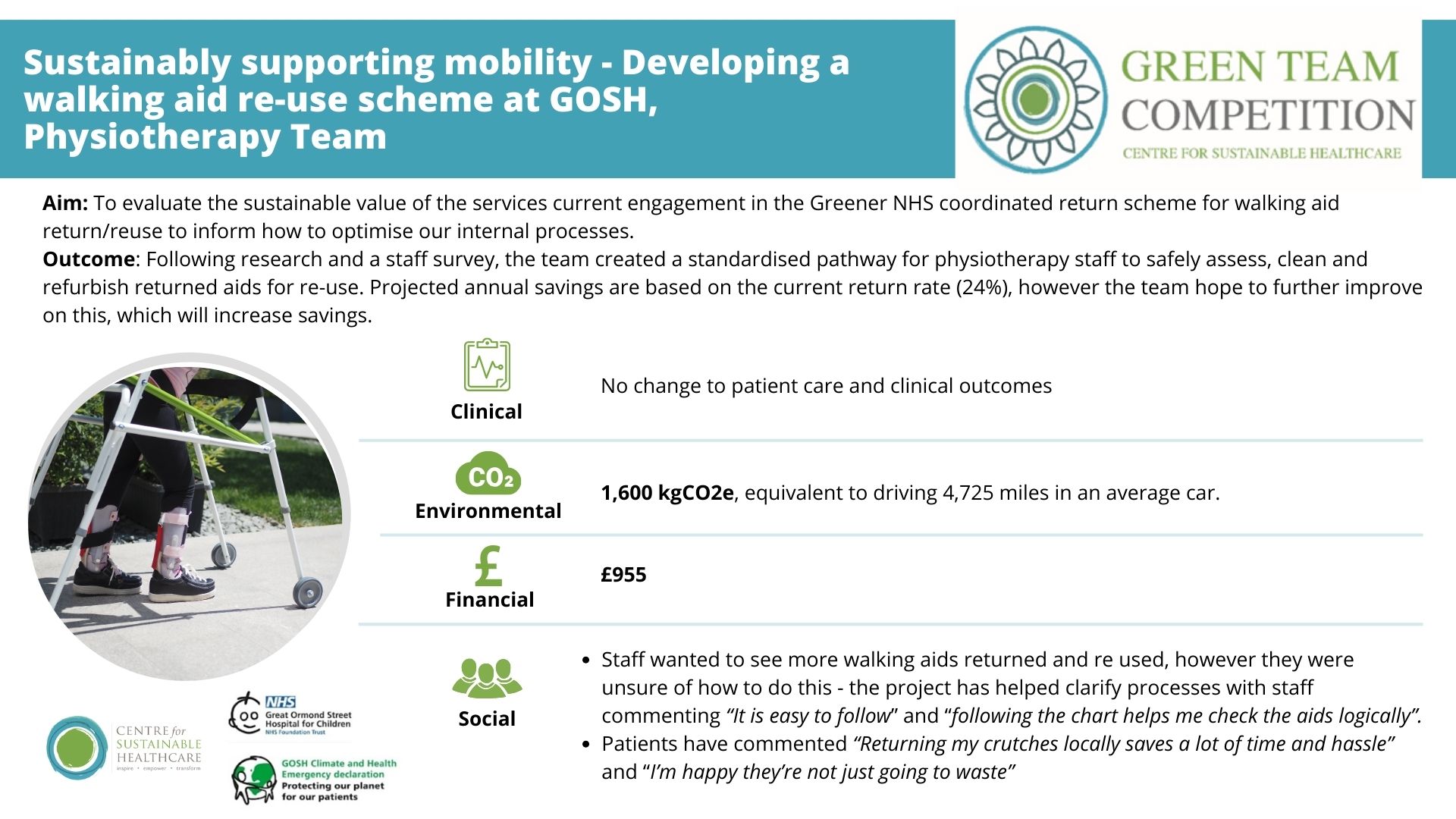
Team members: Jessica Gowing, Dispensing Optician; and Meera Nagji, Optometrist
Setting / patent group: Ophthalmology department, paediatric patients with rare or complex eye conditions
Issue
Due to the young age of patients requiring glasses (some are as young as 6 weeks old) and the nature of the conditions seen, many children cannot get a good fit with a standard pair of glasses and require a specialist paediatric frame. The department relies heavily on ‘Tomato Glasses’, a manufacturer based in South Korea that produces fully adaptable frames according to various head shapes and sizes. These work well for many of the ophthalmology patients as they come in the very small sizes required for infants born with cataracts, and their adjustability is beneficial for conditions such as craniosynostosis. The problem faced is that these frames are imported, made from mostly plastic material, are frequently broken or outgrown, and therefore have a short lifespan, with no instructions for green disposal.
The project aimed to create a recycling scheme for glasses. The benefits of recycling surpass the plastic saved, as the scheme should reduce the average patient waiting time, hospital expenditure, staff administrative work, manufacturer materials, packaging, and transportation.
Intervention
The team conducted a survey using a QR code to gauge parents' willingness to participate in a glasses recycling scheme, finding unanimous support for donating glasses back and mixed feelings about refurbished frames. Therefore, they decided to primarily use donated glasses for repairs, with refurbished frames offered to parents upon inquiry.
They confirmed the use of refurbished parts and frames was appropriate under the guidance of the guidance of clinical and regulatory advisers. The team then engaged dispensing colleagues, and it was agreed that once set up, the project would reduce the administrative workload, so we obtained their consent before initiating the scheme.
They also arranged a process for receiving, processing, and storing parts or frames. The team quickly received a sufficient supply of frames, following requests for donations from parents, and so they were able to begin to use the frames as parts when a patient needed a repair. The patient was informed when refurbished parts were used and given the choice of a new part.
Outcomes
The team has successfully implemented the recycling scheme through the engagement of patients and their families, with an average of 16 sides and 14 fronts re-used per month.
Environmental and financial sustainability: projected annual savings of £5,472 and 10 kgCO2e, equivalent to driving 28.6 miles in an average car.
Clinical and social outcome: donated frames mean repairs can be done immediately without waiting at least 1 week for parts to be delivered, reducing the risks of disruption to vision during the critical paediatric period that can cause permanent visual loss.
“I have done so many repairs on the day for patients that have aphakic prescriptions who are now not having to wait for their glasses to be repaired.” - Staff member
Their MDT is supportive of the change.
“That’s a fantastic idea.“ - Staff member
100% of parents reported that they would happily donate old glasses to be recycled, and 53% were happy to receive a refurbished pair.
“Excellent idea and a no brainer for us!“ - Parent
Key learning point
The project has been a huge success, with benefits for patients, staff, and the environment. The support of the rest of the Ophthalmology department was vital in spreading the word and encouraging patients and their families to recycle their glasses. It was also wonderful to see how many families wanted to help in the project—many of whom have wanted to donate lots of old pairs of glasses for years but haven't had a way in which to do this.
